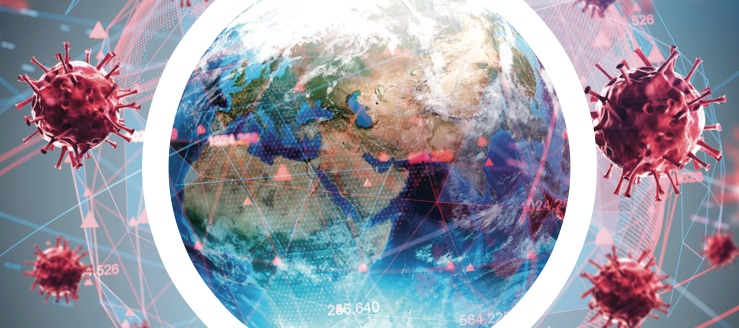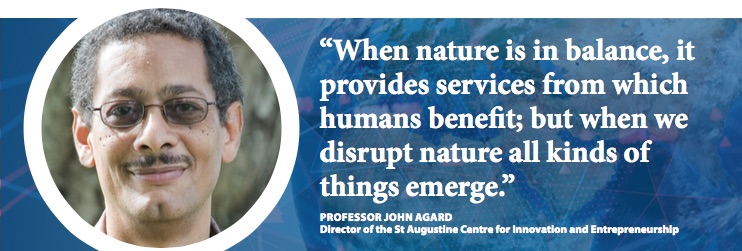A cautionary tale of the impact human beings are having on our planet’s health and the consequences that may lie in store for us all

Nature. She is the source of our sustenance. Our serenity. Our advancements. Our pleasures and...our lifestyles.
Her bounty is responsible for the food we eat, the homes in which we live, the medicines that heal us, the fuel upon which our cities and towns run, and the ideas that advance our civilisation.
Yet we push, prod and poke. Disregard, anger and provoke. Exhaust her gifts and aid in her destruction.
Did we really think that nature would not push back?
It’s been just about four months since the world got its first introduction to what may be one of the greatest threats to global health security and economic stability in the 21st century.
The COVID-19 virus was first discovered in Wuhan, China. On March 11, 2020, the outbreak was declared a pandemic by the World Health Organsation (WHO).
As of March 23, 2020, this novel coronavirus – thought to have emerged through “the sale of wild animals in a wet market in the capital that trades in a wide variety of animals including live wolf pups, salamanders, crocodiles, rats, scorpions, squirrels, foxes, bats and snakes – has infected 374,921 persons and claimed 16,411 lives,” according to the John Hopkins University and shows no sign of slowing down in the immediate future.
The global outlook is grim. Governments are scrambling to stop the spread of the virus and minimise its impact on beleaguered healthcare, social and financial systems. The global economy is being crippled by crashing stock markets, destabilised supply chains, sharp dives in consumer spending and, particularly for small businesses, lack of financial backing. People are fearful over job security, access to food, and their personal safety, in fact, their very survival.
“This is not new. We have ruptured nature by damaging planetary health and it (Earth) is striking back,” declares Professor John Agard, Director of the St Augustine Centre for Innovation and Entrepreneurship and an internationally- recognised expert on environmental and sustainability issues.
Planetary health was in focus last month at UWI’s Planetary Health Conference (See our coverage in the February 2020 issue: https://sta.uwi.edu/uwitoday/archive/ february_2020/article6.asp).
It is defined as “the health of human civilisation and the state of the natural systems on which it depends.”
“When nature is in balance, it provides services from which humans benefit; but when we disrupt nature all kinds of things emerge,” Agard explains. Citing the Centre of Disease Control in the United States, he reveals a startling statistic. Of the 335 diseases thought to have emerged between 1960 and 2004, a noteworthy 60% of them came from animals.
The cause of this emergence, he says, is environmental change as it relates to human behaviour. “We are going into places we should not be going. We are doing things that we should not be doing. We are eating everything that is alive rather than protecting it. We are disrupting forested areas by logging, mining, road building, and urbanisation.” As a result, “people are in very close contact with animal species that we have never been in contact with before”. Disease transference is inevitable, and as for pandemics, he says there’s more to come.
Agard references some of the better known zoonotic diseases – pathogens passed from animals to humans – that have afflicted us in the past including Dengue, Malaria, Ebola, HIV, SARS, MERS, Chikungunya, the plague, Marsburg, Lassa fever, Nipah virus, Zika and Rabies. “So we have a long experience in things being transferred between animals and humans and there will be increasing pandemics like this because humans are invading nature.”

Global Outreach Fellow at the Planetary Health Alliance, Dr Sandeep Maharaj explains further. “For us to continue to have a certain level of living, we actually impact on (our) environmental boundaries.” Maharaj pointed out that these environmental boundaries can only accept and sustain so much of our impact before it undermines the “safe zone” within which we are expected to live if we are to maintain the delicate balance between man’s consumption of nature’s provisions.
“Basically there is a social boundary and an environmental boundary within which we live. That is what we consider to be the safe zone where the planetary and environmental boundaries all operate in equilibrium.” He says that, while climate change may be the most talked about factor impacting these environmental boundaries and imperilling our planetary health, there are other significant culprits. Maharaj named a few: the rate of biodiversity loss, altered nitrogen and phosphorus cycles, ozone depletion, global freshwater usage, atmospheric aerosol loading, ocean acidification, chemical pollution and changes in land use, the latter of which he says is having a major impact on our global health systems.
“In our quest for land, we have species that have been significantly depleted and a lot of these ... actually would be preventers of certain diseases coming into the human system,” says Maharaj who is also the Associate Dean of Distance Education, Projects and Planning at the UWI’s Faculty of Medical Sciences.
This continuous land grab that seeks to fulfil our demand for urban dwellings and raw materials for goods, as well as our seemingly unrelenting desire for the meat of exotic species, has increased the interaction between man and nature creating a big soup for new viruses to enter into the human species. This is where, he says, planetary health falls within the remit of COVID-19 and the like. “Human beings do not generally regress in their consumption patterns”.
A report released by the Intergovernmental Science- Policy Platform on Biodiversity and Ecosystem Services and published in Science magazine on the State of Nature – on which Professor Agard was one of the Coordinating Lead Authors of the global assessment – estimates that ONE MILLION species of animals and plants are currently threatened with extinction. This is unprecedented in the history of mankind and will further exacerbate the risk of future pandemics.
“Seven coronaviruses that affect humans. Four of them cause the common cold; three so far that have caused epidemics and severe disease – the original Severe Acute Respiratory Syndrome (SARS) virus, Middle East Respiratory Syndrome (MERS) virus and now this SARS CoV2 which causes COVID-19. I guarantee you...this is not the last coronavirus we see,” warns Professor of Molecular Genetics and Virology, Christine Carrington.
To mitigate against the impacts of future outbreaks, Carrington suggests greater research to understand viral diversity, the mechanisms animal viruses use to switch from animals to humans and on development of vaccines and antivirals, and especially working towards vaccines that can protect against groups of related viruses.
“Vaccines are key. Antivirals aren’t going to prevent infections; they treat infections. Vaccines prevent infections.”
One thing all the professors agree on is the need for collaboration that is interdisciplinary, pan-sector and cross-border.

“If we approach these issues correctly with expertise in all the disciplines, if we get out of our silos where everybody is thinking they can do everything on their own and we actually have a really cohesive interdisciplinary approach – social, economic, medical, veterinary, policy, (etc) – we will solve these problems,” asserts Christopher Oura, Professor of Veterinary Virology in the Department of Basic Veterinary Sciences, School of Veterinary Medicine, at the St Augustine campus.
There is a real need in the Caribbean, where there is a lack of expertise in certain areas, to work together when these kinds of disasters occur. “So often we are quite good at responding to emergencies like COVID-19 and influenza, but the problem is that, when the dust settles, we return to our previous way of working. So what you have to instil a permanent interdisciplinary culture in the work environment.”
Professor Oura understands what it takes to work across disciplines. He most recently led the European Union-funded One Health, One Caribbean, One Love project, involving 12 Caribbean countries, that is vested in promoting collaboration at a multi-disciplinary level. He’s also taken on another EU-funded initiative, in conjunction with the Pan American Health Organisation.
This time, the objective is to develop climate change and health leaders within the region following this interdisciplinary approach. He stresses the importance of developing leaders in our region who understand these connections between human, animal and environmental health. “It’s a slow burner. You can’t do it quickly. You have to persuade governments and people. We have done the work and it appears to be growing now so that, when things like COVID-19 (and other issues relating to climate change and health) occur, we have people in place knowing how to approach and address the problem”.
Both Professors Oura and Carrington are part of The UWI’s COVID-19 Task Force – a team of regional experts from across the five campuses who are working to provide accurate information about the pandemic and find solutions.
Dr Maharaj is also trying to solve the planetary health problem by building the next generation of Caribbean leaders. “We need to have champions who will actually implement these solutions at the end of the day and make it an everyday mechanism by which we live and operate. Only then will our lifestyle change to possibly looking at planetary health issues rather than just getting up and living life as normal. COVID-19 has shown us that life can drastically change very quickly.”
So, what has COVID-19 taught us?
For Professor Agard, it is the revelation that when placed under severely adverse conditions, the people of Trinidad and Tobago are capable of acting at their best. “That is quite remarkable, humans can behave when they want!” he quips
This shows, he says, that there is the will to act differently when people feel that it is important to do so, a behaviour that will, hopefully, remain entrenched in us long past this current crisis, “to remember to act in the best interest of society and not in individual interest or vested interest”.
The situation similarly demonstrated to Professor Carrington that we all have the capacity to change our patterns. “I do believe it will force people to realise that making what they thought were impossible changes to the way they do things is not impossible. Everyone is having to learn now.”
Ultimately, we have to realise, Professor Oura states that the effects of climate change are going to cause so much more economic hardship and death in our societies than COVID-19. It is therefore imperative that we learn from the current COVID-19 situation and force similar levels of behavioural change to reduce CO2 emissions and save our planet from the impending devastation caused by global warming.”